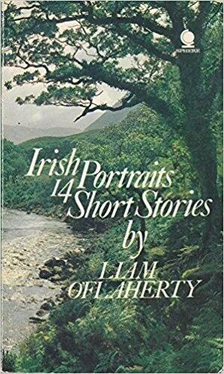Sutton said nothing, thinking angrily of his ploughing and of the rating his wife would give him for not being back in time. Tierney struck his lean, wrinkled face in through the hole and peered about the dark forge, smelling the rank odour of charcoal and twitching his nose. Then he came over to Sutton and sat down.
“Why doesn’t he get a cottage near here?” said Tierney, “and then he’d be in time every mornin’.”
“Huh!” said Sutton. “That wouldn’t suit him at all. The nearest public-house is in the village below in the glen, so he’d rather live there and walk the three miles back and forth every mornin’ so as to be near his pint.”
“Me curse on him, anyway,” said Tierney. “I have to be in the town at eleven o’clock an’ it’s six miles hard goin’. She’d never be able to do it with her two hind shoes off, not to mind that ould woman that’s always on the road, watchin’ for cruelty to animals. It’s ten to one that I’d be had up for the Court unless I get shoes on her first. Where’s this Keegan from, anyway? He’s not a local man.”
“No. He’s a Co. Carlow man,” said Sutton. “Livin’ in sin this twenty years with Mary Karney, ould Ned Kar-ney’s widow.”
“Lord! Oh, Lord!” said Tierney. “It should be put a stop to, so it should. I wouldn’t mind if he did his work, but when a man is livin’ in sin, ye might say, though Ned is dead this twenty years, livin’ in sin with another man’s wife, it’s the least he might do is to mind his work. Wha’? They should be made get married. Wha’!”
“So they should,” said Sutton, “but … hech, hech … don’t ye see the joke? If she marries him she loses her lodge that she has for nothin’ from old Lord Marley on account of old Ned bein’ his honour’s coachman. Hech, hech, hech.”
“Aw! Be the hokey!” said Tierney. “Did ye ever hear the likes o’ that maneness?”
“Hech, hech, hech,” laughed Sutton in his enormous beard.
“An’ he’s a strappin’ young fellah, too,” said Tiernev.
“Hech, hech, hech,” gurgled Sutton.
Laughing, the two old men forgot their irritation and their hurry. They launched forth into one of those interminable and senseless conversations in which mountaineers love to indulge on the most pressing occasions to the detriment of their work, and of everything else, about everything under the sun except the business in hand. Happily, with the eagerness of old women discussing a scandal, they discussed the drought, the change of government, the decline of Lord Marley’s fortunes, the fact that he had now only one riding horse, and only paid his coachman thirty shillings a week, although his wife paid two pound ten a week to the man that looked after her poodles (shockin’, shockin’). Their faces beamed and they were very happy.
Then suddenly they were brought back to the realization of the smith’s continued absence by the arrival of Bridget Timmins with her donkey at a quarter-past ten o’clock. The donkey also had his two hind shoes off.
“Murdher! Murdher!” said Bridget Timmins. “Isn’t he here yet?”
’No, then, he isn’t,” said Tierney. “Are you too afther his blood?”
“I am, in troth,” said she. “Two hind shoes off an’ his poor old hoofs are as thin as a sheet o’ paper, trampin’ the roads for a month without ’em. But sure it’s like this every Monday mornin’. I bet it’s lying in bed he is yet; an’ sure it’s no wonder after last night.”
“How’s that?” said Sutton excitedly.
“I wasn’t there,” said Bridget, in a low, confiding tone, “but I heard Joe Gleeson, the carpenter, tell Mrs. Roddy that ye never saw such skin an’ hair flyin’ in all yer born life.”
Bridget Timmins stopped for breath and the old men gathered themselves together to listen, with their mouths open.
“It was how a charrybank full o’ navvies and their girls came on an excursion from Dublin an’ they all got drunk in Mahon’s an’ started to fight. Then Mahon called the Civic Guards, but sure ye might as well have brought five lame hens as them five policemen for a mob like that. It was nothin’ but screamin’ an’ bottles flyin’ an’ people fallin’ in all directions. Then out comes Keegan in his shirt an’ trousers.”
“Aw! Lord! Oh, Lord!” said Tierney.
“Boys! Oh, boys!” said Sutton, licking his lips.
Mrs. Timmins bent down and, raising her two hands, palms outwards, to her face, she flung them out with a dramatic gesture, as she said with great violence:
“He cleared the street in ten minutes with the handle of a spade.”
“Bravo!” cried Tierney, slapping his thighs.
“God be with him,” yelled Sutton.
At that moment a young farmer’s son named Crow arrived with a broken plough on a cart. He had more definite news of the fight. Standing on his cart, with a hand on his hip, he began immediately to describe it with great vehemence. Another man came on a bicycle with a hoe that needed mending. A young woman stopped on her way to the village for groceries. The postman passed with the letters. He halted to listen. At eleven o’clock there was a crowd in front of the forge, all talking excitedly, boasting, swearing, laughing and cheering for Keegan.
And then somebody shouted: “Here he comes. Here’s himself.”
Everybody looked. He came around the corner, dressed in a blue sweater, with his coat thrown over his shoulder, his cap perched at the back of his curly, black head, swinging his arms, with his enormous chest expanded, his red face grinning humorously.
“Hurrah!” they cried. “Hurrah for Keegan!”
Brunton was waiting in the select bar. There was nobody else there. It was early afternoon and the sun was streaming yellowishly through the muffed windows. Only the lower parts of the windows were muffed. But the upper parts were covered with half-lowered yellow blinds to keep out the glare of the sun. Still, it was very hot in the bar and there was a heavy odour of heat and of alcohol fumes.
In spite of the heat Brunton was wearing a heavy Burberry coat that was buttoned closely about him. It was very soiled and it gave the impression that he wore it in order to hide the shabbiness of his other clothes. Only his cap, his collar and tie, the ends of his trousers and his boots could be seen. They were all shabby, though the boots were meticulously clean and polished. He was a thickset fellow and the coat seemed to be full of wind, on account of the manner in which his full rounded flesh bulged beneath it, even down along the spine, where a coat is usually hollow.
He sat brooding, with his hands in his overcoat pockets, staring at the glass of whiskey which an attendant had placed in front of him five minutes before but which he had not yet touched. His round face was very blotched. There were red flakes on the cheeks, and between the flakes tiny red veins ran through the pallid, puffed flesh. He had thick white eyebrows. His eyes were round and soft, with an expression of mute suffering in them. There was no harm in his eyes. But it seemed that another will, any evil will other than his own weak, mute will, could make those eyes cruel and callous sentinels that would cunningly watch the performance of an evil deed. And they were aware that evil deeds had been performed under their gaze. They were so mournful and reproachful; staring, faded, blue, round, liquid eyes behind the upward-heaving flesh of his flabby cheeks. His nose was thick and ill-developed, like a bulbous root grown in rocky soil. And his hopeless mouth, with drooping, thick, purple lips, looked sad; an ill-used mouth.
Three months before Brunton had been dismissed from the army. He had been a lieutenant. But he had been merely an officer out of consideration for his past services to the revolutionary movement that had put the present government in power. He was in no way fitted for the job of commanding men and doing the other silly chores that form the duties of an officer in peace-time. During the war against the British and during the Civil War he had been invaluable; a dour, silent, unthinking gunman. But now these people had no further use for him. Afterwards … governments and politicians become respectable, no matter what their origin and the methods by which they rose to power. They dropped him silently. They wanted smart young men. This Brunton knew too much. He was too fond of drink. He had become insolent and contemptuous of authority, under the influence of his old lawless pursuits. He would not parade. He would not salute his superiors. He got drunk often, and drunk he talked abusively of the “b - s that were robbing the country which he and the likes of him had won for them.”
Читать дальше












